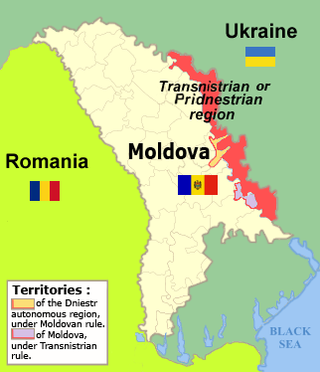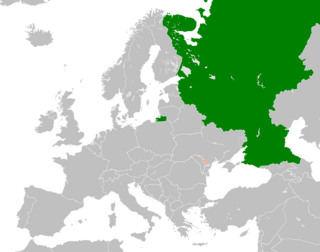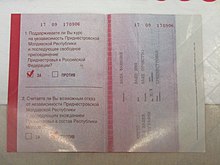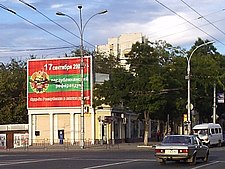
After achieving independence from the Soviet Union, the Republic of Moldova established relations with other European countries. A course for European Union integration and neutrality define the country's foreign policy guidelines.

Transnistria, officially known as the Pridnestrovian Moldavian Republic (PMR), is a breakaway state internationally recognized as part of Moldova. Transnistria controls most of the narrow strip of land between the Dniester river and the Moldova–Ukraine border, as well as some land on the other side of the river's bank. Its capital and largest city is Tiraspol. Transnistria is officially designated by the Republic of Moldova as the Administrative-Territorial Units of the Left Bank of the Dniester or as Stînga Nistrului.

Igor Nikolaevich Smirnov is a Russian-born Transnistrian politician who served as the first president (1991–2011) of the internationally unrecognized Pridnestrovian Moldovan Republic.

The politics of Transnistria, a de facto independent state situated de jure within the Republic of Moldova in Eastern Europe, take place in a framework of a semi-presidential republic, whereby the President of Transnistria is head of state and the Prime Minister of Transnistria is head of government. Executive power is exercised by the government. Legislative power is vested in both the government and parliament. Formally, Transnistria has a multi-party system and a unicameral parliament, called the Supreme Council. The president is elected by popular vote. The latest parliamentary elections were held in November 2020.

The Transnistrian War was an armed conflict that broke out on 2 November 1990 in Dubăsari between pro-Transnistria forces, including the Transnistrian Republican Guard, militia and neo-Cossack units, which were supported by elements of the Russian 14th Army, and pro-Moldovan forces, including Moldovan troops and police.

The Transnistria conflict is an ongoing frozen conflict between Moldova and the unrecognized state of Transnistria. Its most active phase was the Transnistria War. There have been several attempts to resolve the conflict, although none have been successful. The conflict may be considered as having started on 2 September 1990, when Transnistria made a formal sovereignty declaration from Moldova.
The 2006 Transnistrian customs crisis started on March 3, 2006, when Ukraine imposed new customs regulations on its border with Moldova on the Transnistrian region by declaring that it will only import goods from Transnistria with documents processed by Moldovan customs offices, as part of the implementation of a joint customs protocol between Ukraine and Moldova on December 30, 2005.
Aleksandr Radchenko was an ethnic Ukrainian politician and human rights activist from Transnistria. A former Soviet military officer, he was the editor of a small opposition newspaper in Tiraspol called Chelovek i ego prava. Most of his articles deal with human rights issues.

The state of affairs with human rights in Transnistria has been criticized by several governments and international organizations. The Republic of Moldova, and other states and non-governmental organizations (NGOs) claim that the government of Transnistria is authoritarian and has a record of arbitrary arrest and torture.

The Russian Federation holds an unknown number of soldiers in Transnistria, an unrecognized breakaway state internationally recognized as part of Moldova. This Russian military presence dates back to 1992, when the 14th Guards Army intervened in the Transnistria War in support of the Transnistrian separatist forces. Following the end of the war, which ended in a Russian-backed Transnistrian victory and in the de facto independence of the region, the Russian forces stayed in a purportedly peacekeeping mission and reorganized in 1995 into the Operational Group of Russian Forces (OGRF), currently guarding the Cobasna ammunition depot. Some other Russian soldiers also participate in the Joint Control Commission between Moldova, Russia and Transnistria since 1992.
The mass media of Transnistria, the breakaway territory within the borders of Moldova, features both state-owned or supported outlets and opposition media. Publications are in Russian, with a single newspaper in each of the other two official languages, Moldovan (Romanian), and Ukrainian.

A referendum was held in Transnistria on 1 December 1991, in which Transnistria voted to continue its de facto independence and seek international recognition as a separate, sovereign country and member of the international community.

Parliamentary elections were held in Transnistria on 12 December 2010. All 43 seats of the Supreme Council of Transnistria were up for election. Transnistria uses first past the post with 43 single seat constituencies.

The Ministry of Defense of Transnistria is a government agency of the partially recognized Pridnestrovian Moldavian Republic. It is the executive body in implementing defense policies in of the Armed Forces of Transnistria. The current Minister of Defense is Major General Oleg Obruchlov.

Moldova–Transnistria relations are the political and economic relations between the Republic of Moldova and Transnistria, an unrecognized state between the Dniester River and Ukraine. During the dissolution of the Soviet Union, political tensions in the Moldavian Soviet Socialist Republic led to Transnistria declaring independence from Moldova, culminating in the Transnistrian War of 1992. As part of the ceasefire agreement ending the war, a Joint Control Commission composed of Moldovan, Transnistrian, and Russian forces was established to supervise the demilitarized zone which was located in the Transnistrian region. The Joint Control Commission still supervises the zone, and negotiations to resolve the dispute are ongoing. The negotiations are supported by the Russian Federation, Ukraine, the United States, the European Union, and the Organization for Security and Co-operation in Europe (OSCE).

Russia–Transnistria relations are the bilateral relations between the Pridnestrovian Moldavian Republic (Transnistria), an unrecognised breakaway state that is internationally recognised as part of Moldova, and the Russian Federation. Russia does not officially recognise the independence of Transnistria; nevertheless, Russia maintains special relations with Transnistria in the political, military, cultural, and economic spheres.

Transnistria and the United States do not have official diplomatic relations as the United States is among the vast majority of countries that does not recognize Transnistria as a sovereign nation and instead recognize the region of Transnistria as part of Moldova.

The government of Transnistria, a breakaway state internationally recognized as part of Moldova, has requested annexation by Russia numerous times. Transnistria is a territory that separated itself from Moldova due to fear of a possible unification of the latter with Romania. This sparked the Transnistria War, in which Russian-backed Transnistria managed to stay separate from Moldova. Despite this, today Transnistria is legally and internationally considered part of Moldova.
The Yushchenko Plan, also referred to as the Ukrainian Plan, was a unsuccessful 2005 plan developed by then-President of Ukraine Viktor Yushchenko and Secretary of the National Security and Defense Council Petro Poroshenko in an effort to bring an end to the Transnistria conflict by peaceful means with the support of Moldova and the Organization for Security and Co-operation in Europe (OSCE).

Roman Yevgenyevich Konoplev is a Russian and Transnistrian political and public figure, strategist, publicist, writer, now resident in Portugal.
















